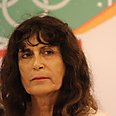
Israeli sprinter relives Munich terror
Esther Roth-Shachamorov was Israel's last hope for medal at 1972 Olympic Games, but it was not to be. 'Instead of running, we found ourselves in the stadium for the memorial service," she says. 'There we stood, crying.'
Afraid she was late for her race, that is.
At that point, she had no way of knowing that two members of the Israeli delegation to the 1972 Munich Olympics were already dead, and that nine more – including her coach Amitzur Shapira – were being held hostage.
"I put on my running gear and opened the door," said Roth-Shachamorov, who was scheduled to run in the semi-finals of the 100-meter hurdles the next day.
She was surprised to see the woman in charge of the corridor and a female Israeli swimmer from the room next door.
"They had knocked on my door to tell me that terrorists had infiltrated the men's quarters," she told AFP.
"I couldn't understand – what did they mean by terrorists? We're at the Olympics.
"It was a very frightening situation," she said.
It was September 5, 1972, the day a group of gunmen from the militant Palestinian group "Black September" broke into the quarters of the Israeli men's team at the Olympic Village, killing an athlete and a coach, taking nine others hostage, and demanding the release of 232 prisoners.
At the time, the Palestinian Liberation Organization (PLO) was endorsing and carrying out spectacular guerrilla attacks in order to force the Palestinian cause onto the international agenda.
Roth-Shachamorov, who was 20 at the time, was Israel's last hope for a medal at the Munich Games which was already drawing to a close after 11 days of world class sport.
She had already run in the 100 meters, and although she failed to qualify for the finals by a photo-finish, the young Israeli was confident she would be among the fastest women in the 100-meter hurdles.
"I was in my prime, I was the biggest surprise there. I was like a wild horse let loose, the setting was good for me," said the now 60-year-old who teaches physical education at a school near her home town of Ramat Hasharon, just north of Tel Aviv.
After a disappointing showing at the Games for Israel, everyone was suddenly buoyed by her chances of success.
"Till then, nobody had got very far, and suddenly I was," she recalled.
"Everyone was very excited. I remember hearing that even government meetings were to be stopped in order to watch the race. Everyone was waiting for the next stage."
But it was not to be.
Roth-Shachamorov and all the other Israelis were quickly herded off into a separate building where, under heavy protection by German police, they watched the hostage negotiations playing out on television.
"I remember an exhausting and frightening day," she said.
"We saw the Germans conducting negotiations with the terrorists through the balcony. They were threatening every two hours that if 200 Palestinians were not released, they would throw an Israeli down on the street.
"We stood watching the clock and said it's 12 pm, what now? And now it's 2 pm, what will happen now?"
'My soul was torn'
That night, buses took the gunmen and their hostages to helicopters which were to fly them to a nearby airbase from where they would continue on to Cairo.
"As the helicopters climbed into the air – they were going to continue the negotiations from an Arab country – there was a feeling that it's all about to be behind us," she said.
And that was when the doctor from the Israeli delegation told her she would be competing the very next day.
"My coach is in the air, I'm scared, it was a day full of tension – my soul was torn," she recalled.
"A coach is everything for an athlete," she said of Shapira, who had been training her for six years.
"I said: How can I? The doctor said: We'll give you two sleeping pills, you'll get some sleep.
"The Israeli ideal of not succumbing to terror was supposed to be played out through me," she said dryly.
Alone, and without the security of having her coach on hand, Roth-Shachamorov went to bed the night before her crucial race.
"I took the pills, which had a strong effect on me, but the night was not peaceful," she said. "I had dreams, but I wanted to win for the country, for my coach."
Once again, her sleep was interrupted – this time when they came to break the news that all nine hostages had been killed in a bungled rescue operation by the German security forces.
A West German policeman also died in the incident, along with five of the eight hostage takers.
The next day the Israeli delegation decided to leave the Games after a memorial service.
"Instead of running, we found ourselves in the stadium for the memorial service," she said. "There we stood, crying."










